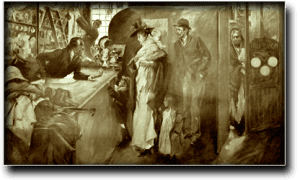Lending money against your goods has been practised in many ancient countries, such as China, ancient Greece Europe. It helped many bank families in Italy gain dominance was one of the first legislated industries in England. Indeed in the year 1695, the very first bank of England established “pawnshops” with a set rate of interest to help the poor, who at the time had no legal protections. It is not surprising, in a city that was the early home of fine jewellery, fashion banking, that it has always been a significant force.

Pawnbrokers Act of 1785
This act licenced pawnbrokers to ensure they were known abided by set rules. The licence fee was £10 in London £5 for the country, which at the time was a staggering sum. The interest rate was set at a low of 0.5% a month, loans were confined to one year. Also, “brokers” could be fined twice an item’s worth if they didn’t return it when payment was made.
Pawnbrokers Act, 1800
Introduced by Lord Eldon, this proved popular with pawnbrokers, as it increased the interest they could charge to 1.5%, it also changed the licence fee to £15, which by this time was a decrease in price. This legislation was amended three times finally replaced in 1872 by a new act. During this time, we see pawnbroking was used by many of the poor as their only means of getting a loan, many of the loans written were of low value.
Pawnbrokers Act of 1872
This act introduced many of the rules still in force today, indeed, we see the basis of many basic consumer protections. It was a summary offence to write a loan for a person under the age of 12 years or drunk. Goods to be sold at a public auction the need of the licence holder to inscribe the words “pawnbroker” above the doorway of their shop.
Pawnbroking spread in popularity due to the industrial revolution, which created a new working-class base, remained popular until after the second world war.
Re-branding: The luxury Pawnbroker
The Pawnbroking business has changed, things for a London pawnbroker could not be more different than they were in the Victorian era. While still heavily legislated, the main competition for the pawnbroker comes not from other shops but from the variety of loans on offer. Payday lending, overdrafts, credit cards. There are many options for the consumer when it comes to a fast cash loan. A business will no longer survive on low-value loans but instead needs to specialise.
London the UK is the natural home of the pawnbroker. There is a strong tradition of fine jewellery luxury watches here, only in London is there a street like Hatton Garden, which is home to over 300 jewellery diamond trading businesses 55 shops.
As a result, a shop like Suttons and Robertsons is well known in the jewellery trade helps many traders access fast funds secured against their goods. If you have a ring from the Victorian era or a luxury watch you’d like to see what you could lend against it, even the repayments, please give us a visit or have a look at our loan repayment calculator on our website.





